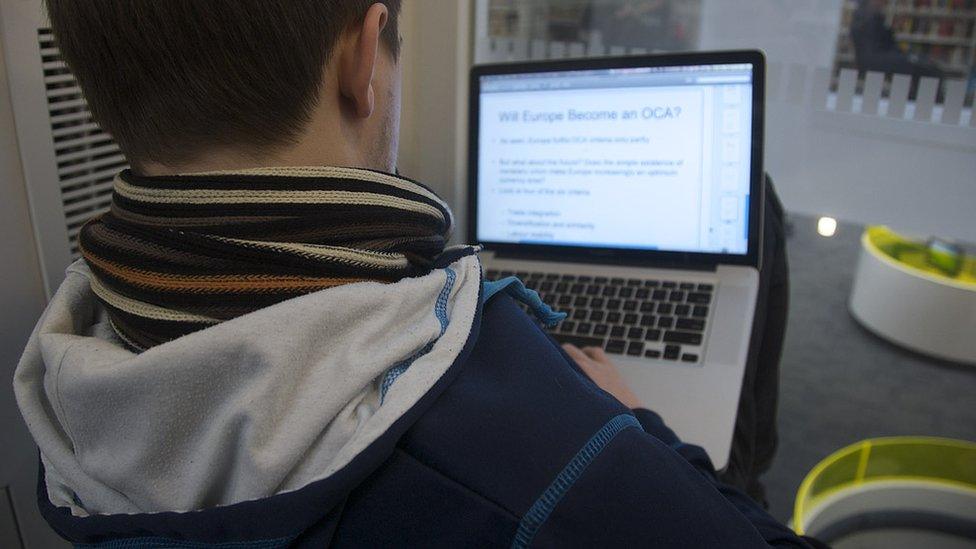Poorer graduates suffer 'silent discrimination' in jobs market
- Published

A new paper suggests students from disadvantaged areas may suffer "silent discrimination" in the jobs market
Students from Scotland's most disadvantaged areas are less likely to secure a professional job quickly, according to a new paper.
The Commissioner for Fair Access to Universities publication highlights challenges facing the graduates.
It suggests they may suffer "silent discrimination" in the jobs market.
The Scottish government wants a fifth of students at Scotland's universities to come from the most disadvantaged parts of the country by 2030.
However, the discussion paper, external - from the commissioner Professor Sir Peter Scott - highlights issues which may need to be addressed to ensure they also get the full benefit of a university education and a degree.
One key point is is that they are less likely to continue their studies on a postgraduate course such as a Master's course or a doctorate.
The discussion paper offers a potential explanation.
In it, Sir Peter said: "The gap is explained, partly although not wholly, by the fact they are more likely to have studied subjects at first-degree level in which fewer students overall progress to postgraduate courses - although this begs the question of why they are under-represented in higher-status subjects where postgraduate progression rates are higher.
"The gap is also explained, partly but again not wholly, by the fact that more socially deprived students are concentrated in universities with lower postgraduate progression rates - although, again, this begs the question of why they are under-represented in more prestigious institutions, notably the ancient universities, where many more students continue on to postgraduate courses."

Students from poorer parts of Scotland are less likely to continue their studies as a postgraduate
As a general rule, Scotland's "ancient" universities and the institutions which became universities in the 1960s have fewer students from the most deprived parts of the country (SIMD 20 areas) than former polytechnics.
Only two institutions currently have met their long-term target for admissions from SIMD 20 areas - Glasgow Caledonian University and the University of the West of Scotland.
The paper adds: "Finally, even the students from more socially deprived backgrounds who do progress to postgraduate study are still significantly less likely to get professional jobs six months after leaving, which suggests that they continue to suffer perhaps silent but nevertheless powerful discrimination."


The Scottish government sees widening access to university as one of its key policy objectives.
Nobody pretends it is easy and that is why the timescale for some targets extends as far as 2030.
It involves a whole range of issues: raising attainment in primary and secondary schools, dealing with misconceptions that may deter some from applying to university, financial challenges and the exam grades needed for some prestigious courses.
But is simply getting to university the end of the story? Or does more need to be done to help ensure students from disadvantaged areas get the full, long-term benefits of a university education?
Anecdotal evidence has sometimes suggested that young people from the most disadvantaged backgrounds may not always be able to make the most of their opportunities.
'Impress potential employers'
For instance, concerns have been raised that gaining work experience in prestigious and competitive industries can rely unduly on personal connections - or on families able to subsidise someone who is not earning money over the holidays.
The same points might be made about a student's ability to travel widely over the summer or even about their ability to network on and off campus.
All these things can help a graduate find good work - the experience might open doors or impress potential employers.
Many graduates go on to keep friends and contacts built during their university days in their professional networks. A generation later, many graduates could well end up with a good range of contacts in top jobs or in public life by simply keeping in touch with old friends.
But might it be harder for students from disadvantaged backgrounds to do this? Perhaps they might be living at home to cut costs and have to work in the evenings or at weekends to support their studies? Meanwhile students from better off families may have more time to socialise on campus or immerse themselves in university life.
'Nuanced challenges'
Perhaps a young person who is a little unsure if university is really for them may, at least initially, find superficially confident middle-class teenagers brought up to believe the world is their oyster a little pretentious or even intimidating?
All these points highlight more nuanced challenges which are hard to easily address.
Another issue highlights how the proportion of new undergraduates from SIMD 20 areas varies between institutions: in general students at the "older" universities are more likely to go on to postgraduate study.
This serves as a reminder that all universities are expected to take in a fifth of their students from SIMD 20 areas within 10 years.